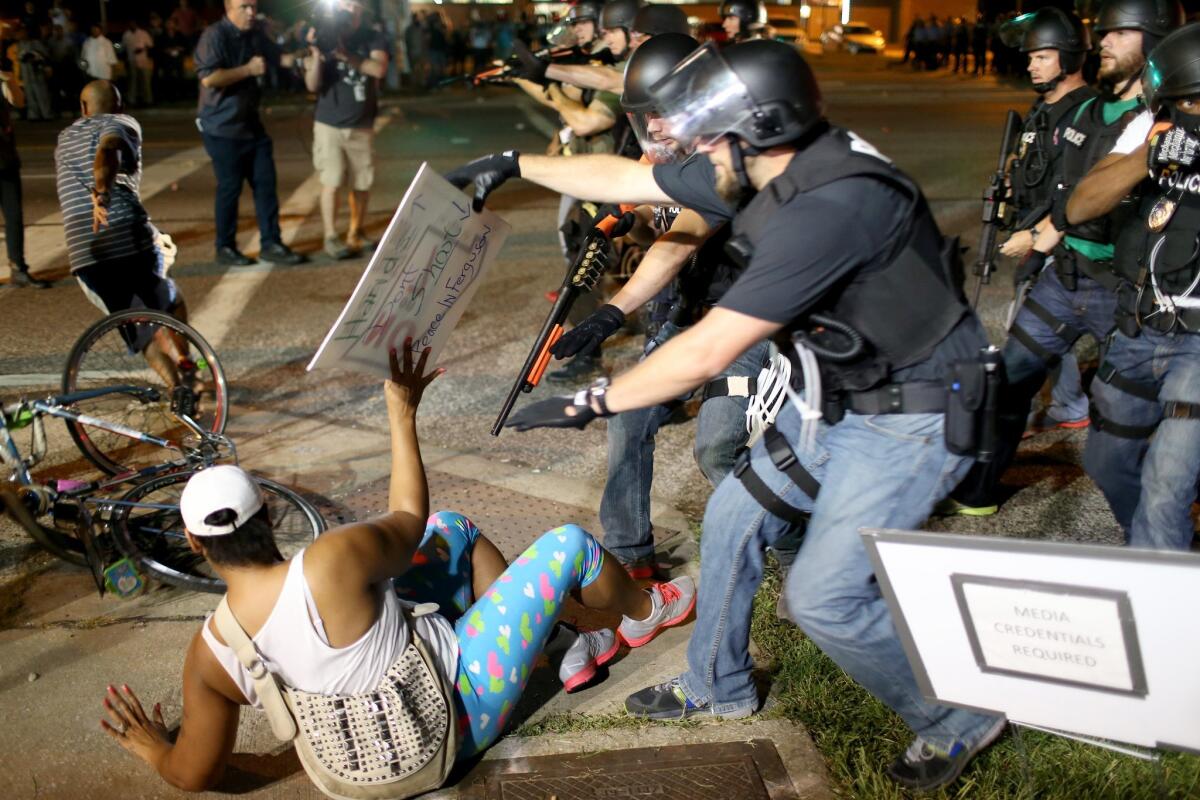2 racist emails cited in federal report on Ferguson police prompt outrage

- Share via
Reporting from Washington — For the activists who cast Ferguson, Mo., as a symbol of the fight against police racism, the Department of Justice report castigating the city’s Police Department for patterns of racial bias was long-sought vindication.
The full report, which is to be released as soon as Wednesday, portrays a troubled, overwhelmingly white department policing a predominantly black city where racism was prevalent, where violence was sometimes used against people of color and where traffic stops focused on blacks as a way to raise municipal funds, according to a law enforcement official familiar with the findings.
“This confirms what many people have been saying for a long time,” said Antonio French, a St. Louis alderman who was a prominent presence during the days of protest that marked Ferguson last August. “The Ferguson Police Department had a pattern and a culture that targeted minorities.”
A glimpse of the police attitudes on racial bias and stereotyping can be seen in two emails exchanged between members of the police force and municipal court officials that were included in the report.
Members of the police force and municipal court officials exchanged racist emails, the investigation found, including one from 2008 predicting that President-elect Barack Obama would not be in office long because, it said, “what black man holds a steady job for four years.”
A May 2011 email, according to the report, said:
“An African-American woman in New Orleans was admitted into the hospital for a pregnancy termination. Two weeks later she received a check for $5,000. She phoned the hospital to ask who it was from. The hospital said, ‘Crimestoppers.’ ”
Ferguson Mayor James Knowles III, City Manager John Shaw, Police Chief Thomas Jackson and City Atty. Stephanie Karr met with Justice Department officials Tuesday to receive the report, according to a statement. The city said it was reviewing the report and would respond after its official release.
The months-long federal investigation comes in response to the fatal shooting in August of an unarmed 18-year-old black man, Michael Brown, by white Officer Darren Wilson. The first wave of protests, which at times turned violent, came in the weeks after the shooting, and a second wave came in November after a grand jury decided not to charge Wilson.
“They wonder why people reacted the way they did to Michael Brown’s death, and clearly this report shows it’s a natural reaction to how people have been treated over the years,” said Michael T. McPhearson, co-chairman of the Don’t Shoot Coalition in Ferguson.
McPhearson also said some of the racist emails highlighted the way local police have dehumanized black citizens and suspects during interactions with the community.
“That shows the mentality and how they look at black people. When you’re looking at a whole community, you’re not looking for criminals. You believe the whole community are criminals. Every person is not even worthy of being treated fairly,” McPhearson said. “There’s no way you’re going to be able to police a community fairly. That’s impossible.”
Cat Daniels has been marching and cooking meals for demonstrators in Ferguson since last summer. She said the findings were a victory for the demonstrators who have dedicated much of their lives to the protest movement in the last year--and proof to the rest of the country that their complaints are valid.
“I am hopeful now, because this is a step in the right direction, but we’ve got a long way to go,” said Daniels, 63, who lives in nearby Florissant.
“It feels good in that respect, because this is what we’ve been yelling all this time,” she said. “This is our reality. Now everybody knows that our reality wasn’t just a fairy tale.”
“There is a huge sigh of relief because my community feels vindicated,” said Patricia Bynes, the Democratic committeewoman from Ferguson who frequently attended protests.
“Nobody will be able to say that we are making this up. You can actually see the information about inhumane police treatment and the institutional racism. It’s not just the Police Department; the court system was going along with it, hand in hand,” she said.
Alderman French agreed that the racism goes beyond Ferguson and includes the other nearby towns that rely on traffic fines for much of their income. He said he was looking forward to changes the report might bring.
“Ferguson is not unique,” he said. “I will be very disappointed if the Department of Justice just pats itself on the back and left.”
More to Read
Sign up for Essential California
The most important California stories and recommendations in your inbox every morning.
You may occasionally receive promotional content from the Los Angeles Times.
















